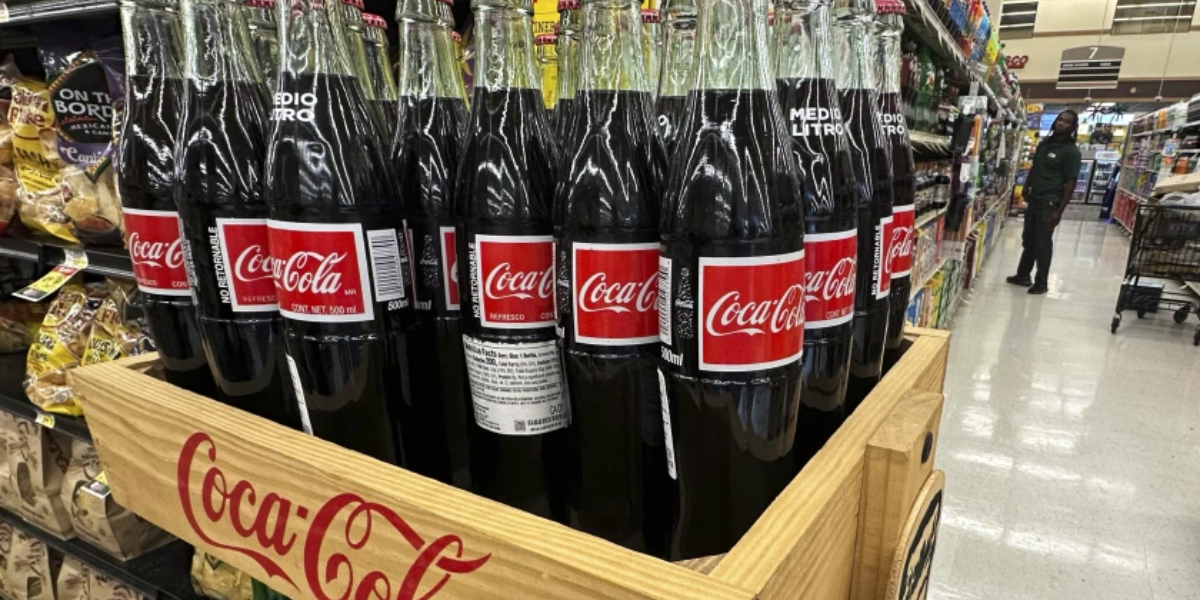Coca-Cola confirmed a previous announcement made by President Donald Trump by announcing on Tuesday that it will be adding a cane sugar version of its signature cola to its menu of beverages available in the United States this fall.
In spite of the fact that consumers now have access to an additional soft drink alternative, maize producers in Illinois are concerned that the decision may have a detrimental effect on their businesses.
The Chairman and Chief Executive Officer of Coca-Cola, James Quincey, announced on Tuesday that the company will broaden its product offering “to reflect consumer interest in differentiated experiences.” At this time, Coca-Cola is selling Mexican Coke in the United States. Mexican Coke is manufactured using cane sugar.
In response to Trump’s statement on social media the previous week, Coca-Cola has decided to replace high-fructose corn syrup with real cane sugar in its flagship drink in the United States. This step comes after Trump made the announcement. Coke did not immediately confirm the change, but they assured that other products would be available soon.
Quincey stated on Tuesday during a conference call with investors, “We appreciate the president’s enthusiasm for our Coca-Cola brand.” Quicey was speaking to investors. This new addition is intended to work in conjunction with our robust core product and provide additional options that cater to a wider range of interests and circumstances.
Following the announcement that was made on Tuesday, the president and chief executive officer of the Corn Refiners Association, John Bode, issued a statement to the Sun-Times in which he stated that “an increased use of U.S. cane sugar is certain to lead to a corresponding increase in imports of foreign cane sugar.”
The substitution of cane sugar for high-fructose corn syrup would result in the loss of thousands of jobs in the food manufacturing industry in the United States, a decrease in farm revenue, and an increase in the trade imbalance, according to Bode.
Bode stated that Illinois would be one of the states that would be most negatively affected, with an adverse impact of $797 million. He based his statement on a research that was commissioned by the association to investigate the cost of transitioning away from high-fructose corn syrup in the United States. Among the members of the Corn Refining Association (CRA) are industrial corn refiners based in Illinois, such as Premient.
In the year 2024, the United States Department of Agriculture reported that maize was produced on 10.65 million acres in the state of Illinois, resulting in the production of 2.31 billion bushels of grain.
In the eyes of farmers like Evan Leeper, the numbers carry significant weight.
Located in Decatur, Leeper, who is 31 years old, is a fifth-generation farmer who cultivates maize on 1,600 acres of land at Leeper Family Farms. This harvest is then transported to a plant in Decatur that is owned and operated by the Archer Daniels Midland Company, which is headquartered in Chicago.
An elimination of the sweetener would have an impact on the premium farms, such as Leeper’s, which receive between 25 and 50 cents per bushel of corn from corn refineries. This would also have a negative impact on the price of corn on the market.
According to Leeper, “If for some reason they would decide to just get rid of corn syrup and move all to cane sugar, that could drop our market price by… 35-40 cents [per bushel],” which is a significant amount of money. It is possible that our farm might suffer a loss of more than one hundred fifty thousand dollars annually if you simply do the arithmetic on our acreage and what we have averaged yieldd.
A similar level of concern was expressed by Leon “Len” Corzine, who is 75 years old and lives in Assumption with his family.
According to Corzine, “Prices have already decreased by a significant amount.” As a result of the fact that the farm is already operating at a loss, he stated that pushing down market prices “just makes everything that much worse.”
According to Bode, the replacement of the sweetener also creates problems about how to supply the growing demand for cane sugar from consumers. Sugar cane is grown in the states of Florida, Louisiana, and Texas; yet, the United States continues to import sugar in order to meet the demand within the country.
Leeper has stated that he is eager to disseminate information regarding the potential effects that Coca-Cola’s decision may have on farming communities in the Midwest. This is particularly important to him because he anticipates that the current crop cycle will be unprecedented in terms of output.
“I have the impression that [Trump] is surrounded by members of his inner circle who may be providing him with guidance based on their own personal interests. What I do know is that a significant number of people in the Midwest voted for him,” he remarked.


 by
by 

